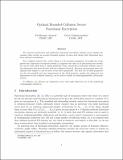Optimal Bounded-Collusion Secure Functional Encryption
Author(s)
Ananth, Prabhanjan; Vaikuntanathan, Vinod
DownloadAccepted version (966.5Kb)
Open Access Policy
Open Access Policy
Creative Commons Attribution-Noncommercial-Share Alike
Terms of use
Metadata
Show full item recordAbstract
We construct private-key and public-key functional encryption schemes in the bounded-key setting; that is, secure against adversaries that obtain an a-priori bounded number of functional keys (also known as the collusion bound). An important metric considered in the literature on bounded-key functional encryption schemes is the dependence of the running time of the encryption algorithm on the collusion bound Q = Q(λ) (where λ is the security parameter). It is known that bounded-key functional encryption schemes with encryption complexity growing with ε > 0, for any constant Q1-λ, implies indistinguishability obfuscation. On the other hand, in the public-key setting, it was previously unknown whether we could achieve encryption complexity growing linear with Q, also known as optimal bounded-key FE, based on well-studied assumptions. In this work, we give the first construction of an optimal bounded-key public-key functional encryption scheme under the minimal assumption of the existence of any public-key encryption scheme. Moreover, our scheme supports the class of all polynomial-size circuits. Our techniques also extend to the private-key setting. We achieve a construction of an optimal bounded-key functional encryption in the private-key setting based on the minimal assumption of one-way functions, instead of learning with errors as achieved in prior works.
Date issued
2019-11Department
Massachusetts Institute of Technology. Computer Science and Artificial Intelligence LaboratoryJournal
Lecture Notes in Computer Science
Publisher
Springer International Publishing
Citation
Ananth, Prabhanjan and Vinod Vaikuntanathan. "Optimal Bounded-Collusion Secure Functional Encryption."
TCC: Theory of Cryptography Conference, Lecture Notes in Computer Science, 11891, Springer International Publishing, 2019, 174-198. © 2019 International Association for Cryptologic Research.
Version: Author's final manuscript
ISBN
9783030360290
9783030360306
ISSN
0302-9743
1611-3349